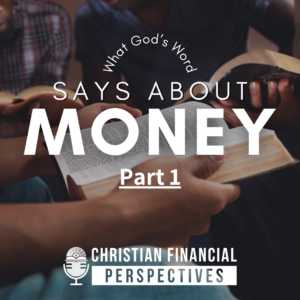Click below to listen to Episode 177 – What God’s Word Says About Money Part 1
Subscribe: Apple Podcasts | Google Podcasts | Spotify | Amazon Music | Stitcher | RSS | More
What God’s Word Says About Money Part 1

Delve into the Biblical financial principles of honesty, debt, giving, and ownership.

Bob and Shawn get back to what Christian Financial Perspectives is really about by delving into key scripture on what the Bible says about money, finance, and stewardship. In part 1, they cover four key biblical principles related to finances: honesty, debt, giving, and ownership with scripture references and real-life applications for each principle.
The importance of honesty in business dealings and the benefits of living debt-free is emphasized, as well as the joy and significance that comes from giving and the responsibility of stewarding God’s creation. Don’t forget to check out part 2 that will be covering saving and investing, inheritance, seeking wise counsel, and faithfulness!
HOSTED BY: Bob Barber, CWS®, CKA®
CO-HOST: Shawn Peters
Mentioned In This Episode
Bible Verses In This Episode
PROVERBS 12:19
Truthful lips endure forever, but a lying tongue lasts only a moment.
PROVERBS 21:16
A fortune made by a lying tongue is a fleeting vapor and a deadly snare.
PROVERBS 22:7
The rich rule over the poor, and the borrower is servant to the lender.
PROVERBS 22:26-27
Do not be a man who strikes hands in pledge or puts up security for debts; if you lack the means to pay, your very bed will be snatched from under you.
PROVERBS 11:25
A generous man will prosper; he who refreshes others will himself be refreshed.
2 CORINTHIANS 9:6
Remember this: Whoever sows sparingly will also reap sparingly, and whoever sows generously will also reap generously.
HAGGAI 2:8
“The silver is mine and the gold is mine,” declares the LORD Almighty.
PSALM 24:1
The earth is the Lord’s, and everything in it, the world, and all who live in it;
Want to ask a question about your specific situation? Schedule a complimentary 15 minute phone call.
EPISODE TRANSCRIPT
Shawn:
Are you navigating the choppy waters of financial decisions and wondering where true north is? Did you know that Jesus spoke more about stewardship than Heaven and Hell combined? Today we’re diving into four key Biblical principles that can set your financial compass straight. Let’s get some perspective.
My name is Shawn Peters. I’m joined as always by my father-in-law and co-host, Bob Barber. Today we’re going to be covering a really exciting topic on what God’s word says about money. We’re going to do this as a two-parter because God’s word does have a lot to say about this entire subject, and we’re going to break it down for you into eight separate subjects. Today, we’re going to cover the first four because there are over 1500 scriptures on stewardship and what the Bible says about money. And many Biblical scholars say that Jesus spoke on stewardship more than Heaven and Hell combined, which seems like it might be important then. So today our first four subjects we’re going to be covering are honesty. Number two is debt. Number three is giving, and number four is ownership. Bob, you got anything to start with us today?
Bob:
Shawn, I will tell you I get very excited when I start talking about God’s word and what it says about money because I’ve been studying it for so many years. What we’re going to do with each one of these is we’re going to say the scripture, then we’re going to have a real life application as to how this would apply.
Shawn:
First subject for today is honesty. We have Proverbs 12:19, “Truthful lips endure forever, but a lying tongue lasts only a moment.” And then our second scripture, Proverbs 21:16, “A fortune made by a lying tongue is a fleeting vapor and a deadly snare.” And just to be forewarned, we do have a lot of Proverbs. Proverbs does have a lot of really good wisdom.
Bob:
It does, and I see this speaking into a lot of protection and prosperity as well, because when you look at that, a lying tongue lasts only a moment and it’s fleeting when you’re lying. So this is the importance of honesty because when you’re honest, good things happen. A society can operate off honesty where it cannot operate if it’s a dishonest society.
Shawn:
Well, and think about that from the idea of protection. So with protection, being honest in your business dealings can offer you protection from potential legal consequences and damaged relationships because you’re not being untruthful. So, you’re not going to run into the same issues of, oh, well, you told one person one thing and then you told somebody else something different, and now you’re getting in trouble somehow for that it just…not a good idea.
Bob:
When you’re dishonest, you always have to be looking behind you.
Shawn:
You got to keep track of what did you do.
Bob:
What did you say? That’s correct.
Shawn:
And then the second one is prosperity. So transparency and honesty builds trust, which can lead in the long-term to prosperous relationships and partnerships, both personally and professionally.
Bob:
Another area that the Bible speaks into, of course, is debt. And Proverbs 22:7, it says, “The rich rule over the poor and the borrower is servant to the lender.” Now think about that. Banks, okay, banks, lending institutions, we become basically servant to them or a slave to them when they’re lending to us, especially if we over borrow.
Shawn:
The lender does not care if you are borrowing more than you really should be borrowing. If you qualified for it. Sure. They’ll lend it out to you and then they’ll snatch your home out from underneath you if you can’t pay for it. So it’s very important in this case, make sure that you are doing what you should as far as how much you’re borrowing, not what you are say approved for, because that doesn’t necessarily equal to the same number.
Bob:
No, it doesn’t. And Proverbs, this 22nd chapter is about debt. And again, so we mentioned Proverbs 22:7.
Shawn:
And then we go into Proverbs 22:26-27, “Do not be a man who strikes hands in pledge or puts up security for debts. If you lack the means to pay, your very bed will be snatched from under you.”
Bob:
It’s pretty scary.
Shawn:
Yeah. Direct to the point.
Bob:
Basically, it’s like the old saying, Shawn, pull the rug right out from under you if you don’t have the means to pay.
Shawn:
So for real life application, we have two areas, safety and tranquility. So for safety, living debt-free allows for greater financial security and less vulnerability to economic downturns.
Bob:
Yes, it does.
Shawn:
And then for tranquility, no debt means no anxiety over bills, creating a more peaceful living environment.
Bob:
I know that I sleep well knowing my bed’s not going to be snatched out from under me. Now, I know that’s metaphorically speaking, but it’s really about things being taken away from you if you’re not wise with what you do. It’s like they call the guy repossessing, repossessing a car if you’re not paying for it. There’s a lot of peace that comes and tranquility that comes with being debt-free.
Shawn:
And so now on to number three of four for today is number three, giving. The first scripture on this is Proverbs 11:25, “A generous man will prosper. He who refreshes others will himself be refreshed.” That’s a good one. And 2 Corinthians 9:6, “Remember this, whoever sows sparingly will also reap sparingly, and whoever sows generously will also reap generously.”
Bob:
I think these scriptures can apply to real life by giving provides joy, and it also provides significance. Because you’re doing something of significance when you’re getting outside of yourself, and you think about supporting the Habitat for Humanity or supporting your church or around here, we support Compassion very strong and those children. And there’s so much joy that giving brings.
Shawn:
Well, there’s a reason it’s better to give than to receive.
Bob:
Yeah.
Shawn:
And giving allows us to tap into something that God first did for us, that God sent his Son for us to be able to redeem us back to him. And so when we give, not only are we being more like God, we are giving of what he has given to us, but we’re also showing that we trust him. And there’s a lot of joy in that, in trusting, okay, God, I’m trusting you that by giving to someone else, by giving from what you’ve given to me, that you will continue to take care of me and take care of my family and our needs. So joy, the act of giving can provide emotional and spiritual joy knowing that you’ve made a positive impact on someone’s life, and of course significance, your generosity can leave a lasting impression and perhaps even inspiring others to be generous as well. That could be something where maybe in your financial planning and your estate planning that you set things up to a portion of whatever you have left in your estate would continue to give to a charity ongoing or to your church.
Bob:
And we’re going to talk about inheritance next week and what that says, that’s going to be for our number five through eight areas.
Shawn:
I guess that was Easter egg, right?
Bob:
That’s exactly right.
Shawn:
So subject number four, ownership. Haggai 2:8, “The silver is mine and the gold is mine, declares the Lord Almighty.” And Psalm 24:1, “The Earth is the Lord’s and everything in it, the world and all who live in it.” The two areas of real life application for this one – responsibility, recognizing that all you “own” is actually God’s, encourages better stewardship and responsibility. And like we said, taking care of God’s creation, it motivates you to take care of the environment and the people around you knowing that they all belong to God and are his creations as well.
Bob:
I can see how these can apply to real life, like responsibility. Responsibility with what we have, the material possessions that we have, and taking care of them. Also taking care of God’s creation. You hear bad things about, “Well, that environmentalist, he’s crazy. All he cares about is the environment. He doesn’t care about people.” Wait a second, God created. So if we love the Creator, take care of the creation.
Shawn:
We can do both. We obviously, yes, we need to take care of people. And if you ask me what’s more important, this tree or this person, I’m going to pick the person every time. But that doesn’t mean that we shouldn’t try to take care of the rest of God’s creation. He put us in charge. He left us. He put us on this earth, and that’s part of it.
Bob:
Talk about this a little bit more about the material possessions as well, because we look at our car, we look at our home, how are we taking care of them? If we believe God owns them, then we should take good care of them because he’s put us in charge of that home. He’s put us in charge of that car. And that’s why you want to keep a clean car. That’s why you want to keep a clean home. That’s why you want to keep things in order because God gave you that.
Shawn:
Tell that to a one and a half and a four and a half year old though.
Bob:
Yeah, I know.
Shawn:
They have not learned, in my household, they have not learned that yet.
Bob:
Yeah, no. Hey, I remember when we had teenagers, we just closed the door and just said, okay, we’re going to take care of the rest of the house.
Shawn:
I heard somebody say it one time, Bob, name one thing more efficient than a toddler making a mess. Go ahead. I’ll wait.
Bob:
I’m not going to. But you know, the other day when I was playing with your daughter, my granddaughter, by the way, she would take the Lego apart and I’d put it back together and she’d take it apart and I’d put it back together. So I kept trying to put it together and she would just, and then throw it just wherever.
Shawn:
Exactly.
Bob:
So there you have it. That’s the first four for today. Believe me, there’s so many. I thought about this. This series about what God’s word says about money. By the way, we could just make this an entire podcast program. We could do 1500.
Shawn:
Well, sure.
Bob:
Because there’s 1500 scriptures it has to do with. So we’re not going to do that. Okay? But next week we’re going to cover what God’s word says about saving and investing, inheritance, seeking wise counsel, and faithfulness. So you’ll want to join us for the next program as well, and it’s going to really be inspirational. We want to operate by God’s principles, Godly principles in the Bible for handling finance. And that’s what we do at Christian Financial Advisors. And if you would like us to help you align your investments and your portfolio and your financial planning with what God’s word says about money, you can give us a call at (830) 609-6986. You can text that number as well, or you can find us on the internet www.christianfinancialadvisors.com. Any last words, Shawn?
Shawn:
That’s right. Thank you so much for joining us and God bless.
[DISCLOSURES]
* Investment advisory services offered through Christian Investment Advisors Inc dba Christian Financial Advisors, a registered investment advisor registered with the SEC. Registration as an investment advisor does not imply a certain level of skill or training. Comments from today’s show are for informational purposes only and not to be considered investment advice or recommendations to buy or sell any company that may have been mentioned or discussed. The opinions expressed are solely those of the hosts, Bob Barber and Shawn Peters, and their guests. Bob and Shawn do not provide tax advice and encourage you to seek guidance from a tax professional. While Christian Financial Advisors believes the information to be accurate and reliable, we do not claim or have responsibility for its completeness, accuracy, or reliability.









